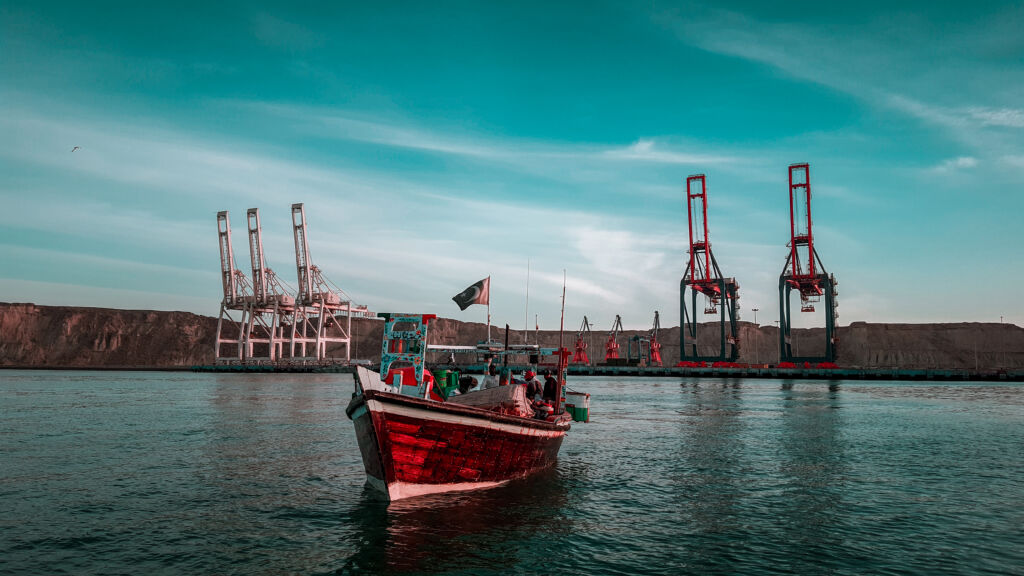Content warning: this article discusses repression tactics including gender based violence, specifically rape, and mentions suicide.
"If the BELT and Road Initiative [BRI] is like a symphony involving and benefiting every country, then construction of the China-Pakistan Economic Corridor [CPEC] is the sweet melody of the symphony’s first movement,” said China’s foreign minister Wang Yi in 2015. China’s BRI is the largest infrastructure project in the world consisting
of economic corridors—roads, pipelines and maritime links—connecting Asia with the Middle East, North Africa and Europe. Chinese spending on BRI infrastructure projects, including mines, ports and other mega-projects at home and in countries along each corridor, could reach $8 trillion over the next 20 years.
China has Belt and Road cooperation agreements with 80 countries and organizations, and has built 75 overseas economic and trade cooperation zones in 24 countries. BRI has however, hit a significant roadblock in Pakistan. There is major opposition to the initiative in Pakistan’s Balochistan province, where ethnic Baloch are fighting
a separatist insurgency against a Pakistani army accused of massive human rights violations. Balochistan is crucial to the creation of the CPEC, which in turn is a major part of the BRI.
Gwadar port in Balochistan, a BRI-funded project, will give China an important alternate route for oil imports from the Middle East. Pakistan and China are also building road and rail networks between Gwadar and Xinjiang, China’s largest province bordering Pakistan. China plans to invest $62 billion in CPEC.
Balochistan comprises 43% of Pakistan’s land area and holds most of its natural resources, including a rich supply of oil, natural gas, coal, copper, gold, silver, platinum, aluminum and uranium. Yet the Baloch, who represent 3.38% of Pakistan’s population (about seven million people), have long been oppressed by the country’s army, and 63% live below the poverty line. Natural gas from Balochistan produces 40% of the country’s primary energy, but only 6% of the Baloch receive it and the province only gets 12.4% of gas royalties.
Given such deprivation, it is not surprising there have been five Baloch insurgencies against the central government since 1948, the latest one starting in 2003. Baloch insurgents and nationalists have called on China to stop the construction of the CPEC until the province becomes independent.
Up to 100,000 Baloch have been murdered and forcibly disappeared by the Pakistan army since 2005, Naela Quadri Baloch told me, adding “CPEC is a death sentence for the Baloch people.” She is president of the World Baloch Women’s Forum and accuses the army of having “rape cells” in Balochistan and “using rape [of both women and young boys] as a tool of oppression.”
Quadri Baloch blames the military’s increased violence on Beijing’s interference. “China is looting the resources of our province, including the gold reserves, and turning a blind eye to the genocide of the Baloch by the Pakistan army,” she told The Indian Express in April 2016. According to Quadri Baloch, many new roads for the CPEC were being destroyed by Baloch insurgents. Bridges and electric power sources for the Chinese working in Balochistan were also being attacked by insurgents, she told me.
"The guerrilla struggle has the support of the Baloch masses which is the key to its success. Social movements of all kinds... back the call for an independent Balochistan.” - Quadri Baloch
Desmond Fernandes agrees with Quadri Baloch that the genocide description is “relevant” to Balochistan. Fernandes is a former senior lecturer in human geography at De Montfort University in Britain who specializes in genocide studies and human rights. He has both authored and co-authored books on genocide and Pakistan, including The Targeting of Minority ‘Others’ in Pakistan.
As Fernandes puts it, “the ongoing process of destruction, military operations in Balochistan…abductions of Baloch activists, women, children and students, and ‘kill and dump’ targeting of the Baloch fits the pattern of colonial genocide identified by Raphael Lemkin (who coined the term genocide) and other scholars, human rights activists and political commentators.”
"The Baloch people consider CPEC to be part of a Chinese-Pakistani occupation of their land that contravenes the United Nations Charter and international human rights law," Quadri Baloch emphasizes. “We Baloch are a nation and a country occupied by Pakistan which has no right to make any contract about Balochistan with any country. The Pakistan army is a bunch of gangsters and mercenaries who are taking money from China to kill the Baloch people in order to facilitate their mutual occupation of our land.”
Aside from China’s support for the Pakistan army’s massive killing of the Baloch people, Quadri Baloch sees China facilitating the genocide of the Baloch another way: by bringing a large number of its own workers into Balochistan, a staple of Chinese construction projects around the world. “China is making Balochistan Baloch-free,” she warns. “Beijing plans to settle millions of Chinese people in Balochistan to take over our land, economy and administration. Gwadar has become a militarized zone controlled by China and the Pakistan army where the Baloch themselves, the people who belong to the area, are not wanted and are being forced out. This is what China means by infrastructure development.”
The most recent Baloch guerrilla insurgency, which began in 2003 has lasted 19 years—almost four times more than the longest one before it which endured for five years. And it is intensifying. This staying power is particularly impressive given that no foreign country is aiding the guerrillas in any significant way. Even Pakistan’s arch-rival, India, has given rhetorical support to the rebels. One reason for the resilience of Baloch resistance is the unification of different guerrilla groups into one organization known as Baloch People Liberation Coalition (Baloch Raji Ajoi Sangar—BRAS) in November 2018. BRAS includes the Balochistan Liberation Army (BLA), Balochistan Liberation Front (BLF) and the Baloch Republican Army (BRA).
Since this unification, Baloch actions against Pakistani and Chinese targets have been increasing including a daring attack on the Chinese consulate in Karachi (Pakistan’s largest commercial city) on November 23, 2018 and an even more spectacular assault on the Karachi Stock Exchange on June 29, 2020. In November 2021 alone, Baloch insurgents attacked Pakistani forces 16 times killing 19 soldiers and injuring dozens.
A second cause of the Baloch insurgency’s longevity is that “it is not just an insurgency anymore, it has become a national movement” explains Quadri Baloch. “The previous rebellions were led by tribal chieftains [the Baloch social structure is tribal] but the current leadership is drawn from the working class for the first time. The guerrilla struggle has the support of the Baloch masses which is the key to its success. Social movements of all kinds including women’s groups, students, human rights organizations, intellectuals and religious leaders back the call for an independent Balochistan.”
Social movements have been prominent in the Baloch struggle organizing large demonstrations against CPEC recently in July, August and December 2021 in Gwadar. Called by the Baloch Students Organization and attended by tens of thousands of Baloch people, these demonstrations demanded an end to Chinese trawlers that sweep up large quantities of fish around Gwadar, thus denying two million Baloch fisherfolk their livelihood. Other demands included ending the growing drug trade and provision of health and education facilities.
The Baloch protestors staged a month-long sit-in in December and made clear that CPEC had done little for them while the Chinese presence had increased their problems by taking not only their fish but also water resources. The demonstrators also wanted removal of Pakistani military checkpoints that made it impossible for them to move about freely “in their own hometown.”
A third factor behind the insurgency’s continuation which helps cement mass Baloch support for it, is the highly repressive policy of the Pakistan military in Balochistan amid the absence of any political or economic measures that redistribute wealth or power to the Baloch populace. Repression is the only Pakistani response to Baloch grievances. The army’s “kill and dump” policy is aimed at abducting, torturing and murdering anyone suspected of supporting Balochi independence. Most of the victims are civilians including human rights activists, journalists, students, women and even children. “It’s a continuous state of fear under which Baloch people are living,” Quadri Baloch explains. “Even after 19 years, the army has failed to defeat the guerrillas so their repression of civilians has become increasingly vicious. Any family with a son is afraid that he will be picked up by the army and turn up dead. The army has already killed an entire generation of educated Baloch people, doctors and engineers and wiped out many villages. In the village of Keel Kaur, soldiers raped 33 women in one night.”

This repression is not restricted to Pakistan but has become international, affecting the Baloch and sup-porters of their cause living in Canada, Sweden and the Netherlands. In December 2020, Karima Baloch, a woman Baloch political activist studying in Toronto died under suspicious circumstances according to other Baloch activists who believe that she was murdered by Pakistan’s spy agency known as Inter-Services Intelligence (ISI). Karima Baloch’s body was found in Lake Ontario. Toronto police ruled the death a suicide but without doing
a post-mortem. This followed another suspicious death in Uppsala, Sweden, of Sajid Hussain, a Baloch journalist and founder and editor of the Balochistan Times, an online journal. Similar to Karima Baloch, Hussain’s body was found in a river.
Quadri Baloch believes that both activists were killed by the ISI. “It’s out of the question that Karima could have committed suicide,” she says. “She was full of energy and passion to become a voice for her people and was enthusiastically doing so, especially on social media.”
Quadri Baloch points to the third case of Ahmad Waqqas Goraya, a Pakistani journalist living in Rotterdam in the Netherlands, who is not Baloch and not part of the Baloch resistance but has criticized the Pakistan army’s conduct in Balochistan. Goraya was the target of an assassination attempt in June 2021 by Gohir Khan, a British-Pakistani living in London. Khan was arrested by British police and is being tried by a British court presently. The prosecution alleges that Khan was hired by individuals in Pakistan to kill Goraya and offered a payment of 85,000 pounds (about $146,000 Canadian). Khan has not denied this.
Quadri Baloch believes that the attempt on Goraya’s life was a third ISI hit and says “It shows that the Pakistani government is not able to suppress the Baloch resistance movement inside the country and has now taken its criminal activity against our struggle to the international level. So it is imperative that Canada, Sweden and Britain protect their residents and along with the United Nations take steps to stop Pakistan’s killing spree inside its borders and abroad.”








